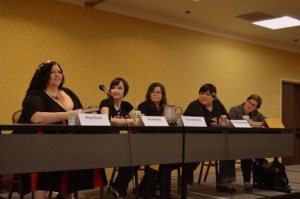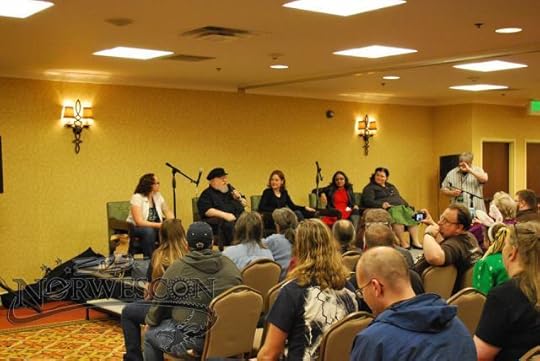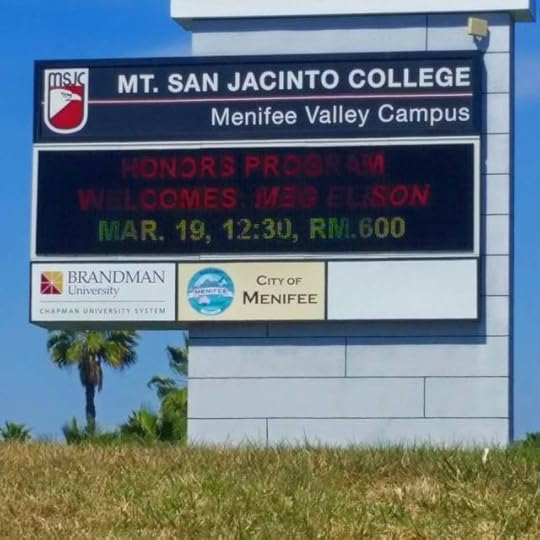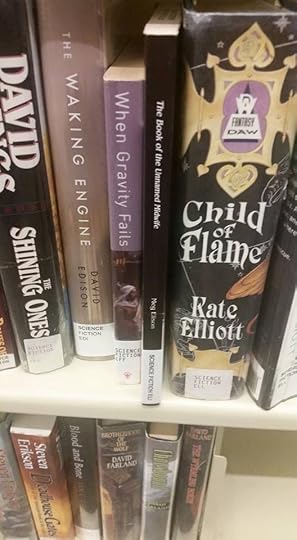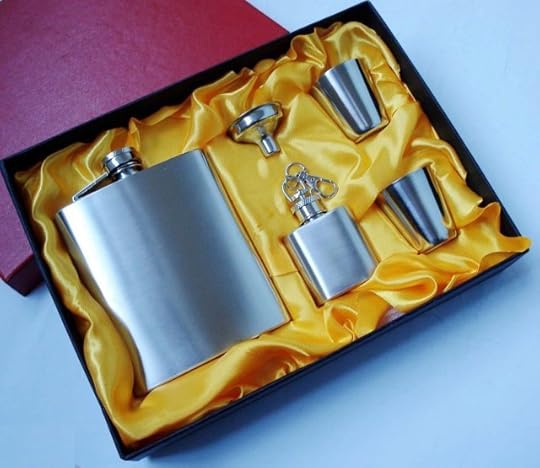Meg Elison's Blog, page 2
May 30, 2015
LA Review of Books Raves about TBOTUM
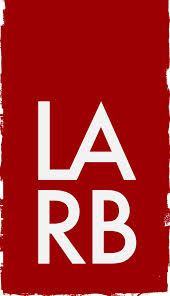 From the front page of the L.A. Review of Books:
From the front page of the L.A. Review of Books:
“In 2015, Elison’s novel won the Philip K. Dick Award, in part because it offers an equally compelling — although markedly different — re-imagination of gender and sexual roles. Elison, quite cleverly, does not reduce women to one meaning or one role; instead, she offers a number of familial structures, including redefinitions of gender and sexuality. In the utopian space of Fort Nowhere, any person can pursue any professional or vocational role, and any person can partake in any one of a range of sociosexual roles. This may not be a fully realized feminist utopia, but it’s a start.”
This is not a review for the prospective reader; spoilers abound. But Ritch Calvin gets it in every way I want a professor of women’s and gender studies to get what I was trying to do. Being understood is priceless. Especially in this business where we are so often misquoted and misread.


May 21, 2015
Palimpsest: the Most Beautiful Book I’ve Read in Ages
One of the shittiest things about growing up (and there are a great many shitty things about growing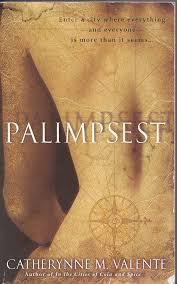 up) is the forfeiture of your magical inheritance. As a child, your passport got you stamped into the Shire, into Fantasia, into Narnia. Your letter from Hogwarts showed up on time without question and you got into Milo’s passenger seat knowing that the Tollbooth was a gateway to adventure. If Peter Pan knocked on the window and you had not yet grown up, you could go with him.
up) is the forfeiture of your magical inheritance. As a child, your passport got you stamped into the Shire, into Fantasia, into Narnia. Your letter from Hogwarts showed up on time without question and you got into Milo’s passenger seat knowing that the Tollbooth was a gateway to adventure. If Peter Pan knocked on the window and you had not yet grown up, you could go with him.
At some point, we all had to live the sad scene from Hook where Wendy admits that it’s over. She got married and passed out of childhood forever; she’s forgotten how to fly. There’s some shame in that admission. It’s never really said, but there are lots of metaphors for it. The most direct one I can remember is the dæmon of Philip Pullman’s His Dark Materials series; once the dæmon has been touched by a lover, it never shapeshifts again. In most fantasy universes, there is some unspoken understanding that only a virgin can ride the unicorn. Growing up means having sex. Having sex means losing innocence, it means handing over the keys to those worlds and being constantly reminded that the real thing is boring, nasty, brutish, and short.
Fantasies for grownups are often built on this; they are costumed fabulist orgies that dress up sex acts to make them more promising than they are in real life. They take a biologically driven absurd necessity and weave it into the magical world, remembering that we are not children and that when we stray back into the realms of faerie, this is pretty much what we’re hoping for. There are good examples: Jacqueline Carey’s Kushiel books are wonderful fantasies for grownups, full of sexy intrigue and allusions to ancient history.
The only book I’ve ever read that accepts that grownups are sad and broken and dtf and still desperately trying to fly toward that second star on the right is Catherynne M. Valente’s PALIMPSEST. This book introduces the concept of a sexually transmitted city. Every person who is infected carries a piece of the map of the city of Palimpsest somewhere on their body. When they sleep with someone, that person is transported to their part of the city. Not only is sex part of the story here, it is the means of transport to the magical world.

Source: http://lovelyelixir.tumblr.com/image/46439392238
There isn’t much of the story I can give away. It is woven with many threads, many connections between lovers and friends and rivals. It is an international story, taking characters from Italy and Russia and Japan. It is a story in which love is blind beyond all reason; couplings and triplings take place in the blind desire to be transported and gender is left in the dust. The truth unravels slowly, like an aerialist unspooling hundreds of feet of silk only to end up dangling still so far overhead that you know she is naked but you can’t make out her face.
This is a book that makes love to trains. This is a book that reveals the subtle ticktock sexiness of insects. This is a book that knows what you really want from a tailor but have always been afraid to ask. This is a book that takes the magic of place and uses it to turn you on and confuse you until you’d make love to an apple tree in bloom. This is a book whose prose is so dreamlike that Ray Bradbury dials it sometimes late at night and asks it to describe New York to him so he can sleep. This is a book that drowns you in a bowl of cream and makes you believe that you have always been a cat. This is a book that scars your face so that everyone who has read it knows you as one of their own. This is a book that teaches us how to find each other.
Reading this was like hearing a thousand stories shouted into a cave while you stand at the other end and try to pick one voice out from the others. It’s about cruising and secrets and the terrible nakedness between long-term lovers. It’s about jealousy and dissatisfaction and immigration and class. It’s about what we expect to know of someone once we have known them in the flesh; it’s about what we will never know.
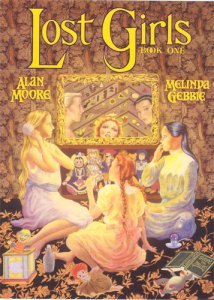
Like this, but not.
Amid the tangle of tales, the one that seared itself to my skin in a crisscross blot of inky streets was the story of November. November is inducted into the society of travelers, but her piece of the map of Palimpsest shows up on her face. She cannot hide it, like the people she knows who are marked on back or thigh. She is unable to deny at all what she has become. In all other fantasy books, this is the end for a woman or a girl. She receives the wound, the brand of having had sex and she can never come back. Except that this is Palimpsest, and her mark brings her to Casimira, the mother of millions and matriarch of the city. November is a fully grown-up woman with a sex life, and the gates of the city will be open to her forever.
For me, this book was about that loss that comes with growing up. It was a moment for me to hold hands with Susan Pevensie and tell her that it isn’t too late for her. It was picking up Dorothy Gale and Alice and Wendy and telling them it isn’t over and I found the way back.


April 29, 2015
NorWesCon 38: a Glorious Blur
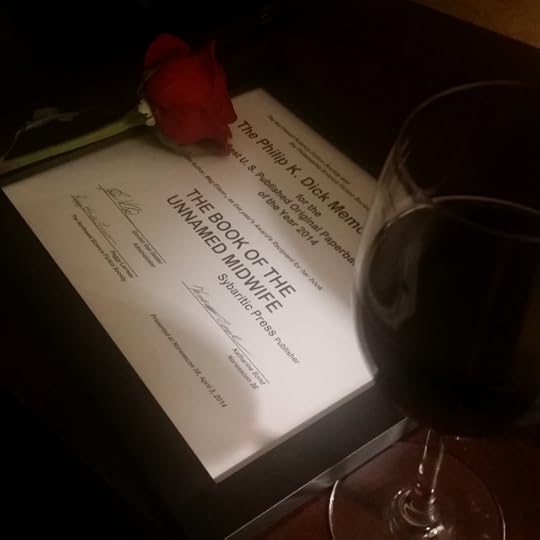 Memory is the ghost of time trapped in meat and it doesn’t always work. It works even less when the meat is excited.
Memory is the ghost of time trapped in meat and it doesn’t always work. It works even less when the meat is excited.
First, an old friend. I was met at the hotel by my friend Julian. I have moved around the world a lot in my life, living as an expat and trading one state for another more times than I can reliably recall. The result of this is that no one stayed my friend out of inertia; everyone who has known me for more than a year or two has been kept for a reason and by force of will. Julian knew me when I was 15, when I had been living on my own for nearly a year, working as an au pair and a dishwasher. To say that he met me in chaos is to understate the human capacity for disorder.
He lived next door to the home where I worked for room and board, the most red-headed of an Irish family. I told him I wanted to be a writer.
Seeing him at NorWesCon brought a wide circle back upon itself. There is a character in Midwife based loosely on someone we both knew back in those days. There is no other person on earth to whom I could have told that story. We sat over coffee and measured the years in each other’s faces.
New friends appeared almost immediately. I met the other PKD nominees��� I don’t know why I expected them to be haughty and dismissive, but I did. I was up against some serious talent and I more than expected to lose. I had accepted loss before boarding the plane, and I just hoped to have fun.
I met Rod Duncan first, whom I had interacted with on Twitter, just a bit. He came and found me, shook my hand, and suggested that we form the League of Authors with Cross-Dressing Protagonists. I liked him immediately; he was funny and genuine and such a gentleman. Soon after, we both linked up with Emmi It��ranta��and her wonderful partner. Both Rod’s and Emmi’s books had blown me away, they’re both huge talents and I was a little starstruck. They are both lovely people, and we got along wonderfully.
We all met Jennifer Marie Brissett the following day, and we knew that sadly neither Cherie Priest��or Jonathan Strahan��were able to attend, so we were four. Jenn, too, was wonderful and much more friendly than I had expected. Jenn, too, had written a book that had impressed and humbled me, and I wanted to ask her a thousand questions about it, ��to tell her I was sure she would win.
We all got time to sit and talk about the process of being nominated and about our lives, where our books had come from and how all this had happened. One by one we confessed that none of us expected to win and that nobody had an acceptance speech ready.
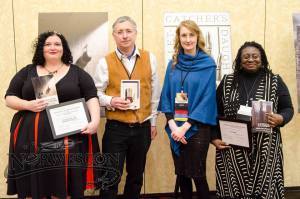
Left to right: me, Rod Duncan, Emmi Itaranta, Jennifer Marie Brissett. Jenn is holding the special citation, I’m holding the PKD.
That long, quiet afternoon was probably the best time I had at the whole convention. I went to parties, drank whiskey and wine. I danced with Browncoats and saluted Khaleesis. I sat on the Iron Throne and had a few moments of glory so acute that I struggle to put words to them. But belonging in that room was the best of it. I am sure.
The day of the award itself I wasn’t nervous at all. I stayed with a friend (a supportive, wonderful old friend) off-site, so I got dressed and did my makeup in the morning and just wore my party clothes all day. I sat on the Feminism in Fandom panel that day and I felt quick and calm.�� I got through dinner just fine and felt absolutely normal.
Once the ballroom opened and people began to stream in for the award ceremony, I readily lost my cool the way a kid loses a balloon. My heart rate skyrocketed. I drank all the water in my glass, then drained the ones at the vacant spaces at my table. My feet pattered in quick rhythms. I bought myself a drink to calm my nerves. It failed.
We each read from our books. Absent writers had someone read for them. I had to go last. My mouth was like the talking flap in the front of a felt puppet. I sat back down unsteadily.
Back home, my husband and friends were watching the live video feed NorWesCon had put online. My mom was watching.
Jennifer Marie Brissett won the Special Citation and accepted it graciously, looking shocked. I was very happy for her, and I immediately wondered whether Emmi or Rod would win the award.
As soon as Jenn sat down, the room felt electrified. My throat closed up and I forgot how to breathe. Seconds later, I was announced as the winner of the 2014 Philip K. Dick Award.
Someone very thoughtful at my table had a camera trained on me and caught the shock and delight on my face in that very moment. I know I walked to the podium and accepted, I know that Gordon van Gelder put the award in my hand.
I know this because I have seen photos.
There was live video at the time, and there was supposed to be a recording after the fact. However, technical difficulties rendered this year’s video useless. So I have to trust my memory and the tweets from that night.
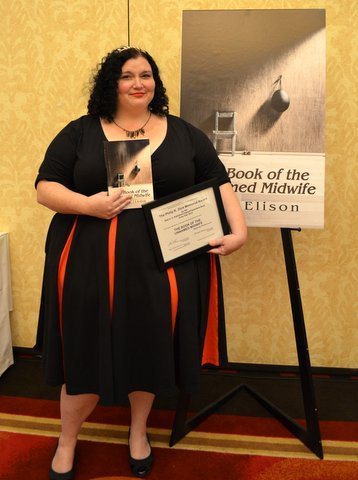 I know that I opened with, “Does HOLY SHIT count as an acceptance speech?” I know that I thanked my people. I know that I closed by saying that this was my Cinderella moment, except that it was so far beyond my expectations that it was more like the prince marrying the pumpkin. Beyond that, the moment is lost to me. I vaguely recall shaking Obama’s hand, pulling the sword from the stone, and flying away on��Falcor’s back.
I know that I opened with, “Does HOLY SHIT count as an acceptance speech?” I know that I thanked my people. I know that I closed by saying that this was my Cinderella moment, except that it was so far beyond my expectations that it was more like the prince marrying the pumpkin. Beyond that, the moment is lost to me. I vaguely recall shaking Obama’s hand, pulling the sword from the stone, and flying away on��Falcor’s back.
The last of the con exists in memory like the view from a fast-moving carousel. I shook hands, accepted drinks and congratulations, hugged and thanked and thanked again. The NorWesCon staff and volunteers were marvelously helpful, even when I lost my badge. The guests of honor were lovely and gracious and it was an honor to appear with them.
NWC 38 was one of the best weekends of my life so far. It’s been a month since then and it feels like years ago and yesterday. I am so grateful for all of it, and for everyone I saw there and everyone who welcomed me home.
This is the best and the strangest life I have ever known.
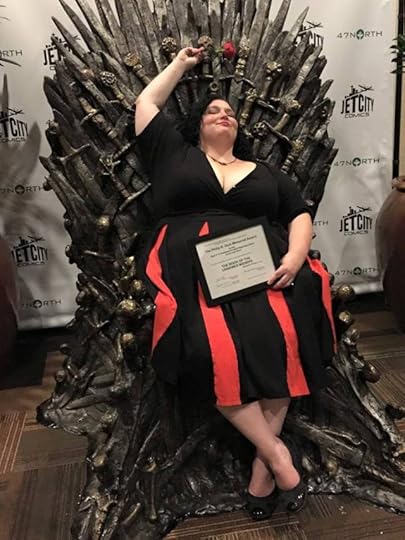
Sometimes a photo just captures the essence of who you are.


April 15, 2015
SoCal Book Tour
Traveling is both the privilege and the curse of a writer’s life.
I spent the the end of March driving all over Southern California, some time in LA followed by a long stint in the Inland Empire. I did three book events in that time, when I wasn’t visiting my mom and trying to eat all the Mexican food that would fit into my gluttonous mouth-hole.
My first appearance was on March 19th, at the Menifee campus of Mt. San Jacinto Community College, of which I am a graduate and from which I transferred to Berkeley. It was a thrill to be back and to talk to a crowd that wanted to know what people do when they leave MSJC and shoot for the moon. What follows is 40 minutes of my story of becoming a writer and taking questions about that process.
(Put this on while you have time to spare, or while you’re washing the dishes or something. I am incredibly long-winded when talking about the thing I love most.)
My second appearance was at the Hemet Public Library. I believe in library systems and use mine every week. When we lived in Hemet, my husband and my MiL both worked at this branch, and it’s always been special to us. That crowd got a reading and a long Q&A, and then bought all the books I had.
I believe in libraries. As someone who grew up very poor, I think of them as one of the best spaces I had access to as a child. It was a clean, well-lighted place staffed with helpful people and full of books I could read for free. I learned how to use computers in a public library, and I was always allowed to belong there in a way that was freeing and unstructured and without expectation.
Finding my book on library shelves is still a pretty emotional experience for me.
My final appearance on this trip to SoCal was at a private book club in Redlands. This group turned out to be all women, one of who was a former college professor of mine. I’ve never been at a table with so many people who read my book before. It was overwhelming in so many fantastic ways���they had specific questions and conspiracy theories and wanted to needle me about the sequel. I was drunk before my first glass of wine. They were incredible, and it was without a doubt one of my best experiences as a writer thus far.
I came home with about a day to spare before leaving for NorWesCon and the Philip K. Dick award. But that is a story for next time.


March 24, 2015
See me at NorWesCon!
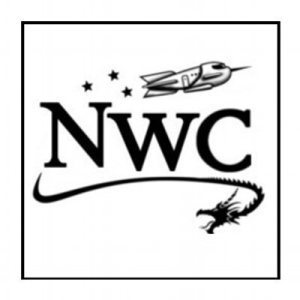
If you’d like to see me at NorWesCon or get a signed copy of my book, this is my loose schedule for the weekend. I’m tied up most evenings with events for the nominees but can make lunch plans with folks.
If I’m not at one of these things, I’m probably trying to hold the Iron Throne with my wits and a handful of toothpicks.
See you in Seattle!
Feminism in Fandom
Fri 10:00am-11:00am – Evergreen 1&2
Sheye Anne Blaze, Rosa Acicularis, Tifa Robles, Meg Elison, Lola Watson
Reading: Meg Elison
Fri 12:00pm-12:30pm – Cascade 1
Meg Elison
Philip K. Dick Awards
Fri 7:00pm-8:30pm – Grand 2
Gordon Van Gelder, Emmi Itaranta, Jennifer Marie Brissett, Meg Elison, Rod Duncan
(At this point I’ll either be drunk on my own ego or happily celebrating someone else’s PKD victory, so…)
Philip K. Dick Award: What It Is, What It Means
Sat 10:00am-11:00am – Cascade 9
Gordon Van Gelder (M), Meg Elison, Rod Duncan, Emmi Itaranta, Jennifer Marie Brissett
When Did Comics Become a “Boy” Thing?
Sat 12:00pm-1:00pm – Cascade 3&4
Mickey Schulz (M), Rachel Edidin, Minim Calibre, Dennis R. Upkins, Meg Elison

February 17, 2015
Chocolate Wasteland
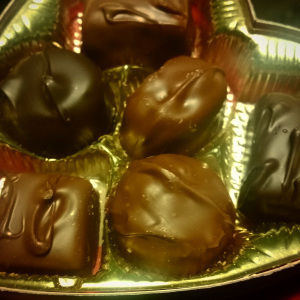
The love song of Russel Stover.
February is the cruellest month, breeding
Roses for dead relationships, confusing
Obligation for the real thing.
Winter kept us coupled, disguising complacency in neglectful rhythm, faking
A little affection with rote sex.
March surprised us, coming over the St. Patrick’s Day display with a shower of green beer; we stopped in the middle of the parade
And went on to the pub crawl, and drank whiskey and talked nonsense.
Erin go bragh! Pogue mahon!
And when we were lovers, staying in the firehouse,
My best friend, she took me out to lunch
And I was wary. She said Meg,
Meg, get out now. And out we went.
At the beach, there you feel alone.
I wrote all night, and swam in the summer.

February 7, 2015
Atlanta Burns: Like a house on fire
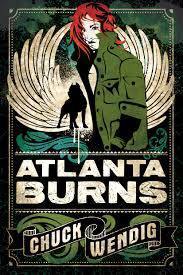 I get really excited about a book that gets me to read a genre I usually don’t like, and makes me love somebody in the process.
I get really excited about a book that gets me to read a genre I usually don’t like, and makes me love somebody in the process.
I don’t usually like noir, although if the secondary genre of this book is (as I’ve heard) “cornpunk,” then sign me up for more of that.
But I love Chris. And Shane. And Whitey. And I love the hell out of Atlanta Burns.
ATLANTA BURNS by Chuck Wendig is a darkly funny and heartwrenching noir story-feast about a girl with a shotgun trying to make things right against Nazis, homophobes, dogfighters, rapists, and her own mother somewhere in the wilds of Pennsatucky. She doesn’t always succeed, but she lives through a hell of a lot. Her adventure brings her a loyal drug dealer named Guy (who lives in a fussy old lady house), and a nerdy kid named Shane who makes good on the purchase of a flea market kitana. The last addition to this team is a Dogo Argentino named Whitey, who I can’t even think about without tearing up. If you’re soft on dogs, prepare for this book to hurt you.
But hell, it also hurts if you flinch at foreclosure. Or fear ‘monsters in men suits.’ Or power-crazed cops. Or if you’re worried that the ‘it gets better’ campaign is awfully simplistic and passive.
While these things hurt, Wendig won’t make you hold out for a hero. Atlanta Burns is a shit-talking, straight-shooting, brave yet scared shitless kid with a shotgun.
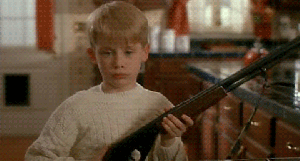
Yeah, I know that’s a pump-action air rifle. YOU try Googling ‘kid with shotgun.’
Atlanta is real and complex and takes the Golden Tampon award for best female character written by a male author. She’s a girl, but she’s a person first. I have a good sense of what she wants, how she thinks, and what her limits are. She starts off as a bad-ass on her own behalf, but by the end she’s really an avenging bad-ass for hire.
Plus, every time some podunk white power dirty cop asshole says her full name, I know they’re seeing this>>>
…which is a huge bonus for me.
Despite the level of tension and the series of nail-biting events, the book is very believable. If you’ve ever lived in some lawless red dot in the middle of nowhere (and boy HAVE I) it will all look very familiar, but bravery in shitty places is always admirable. There was one teensy moment of WTF: Atlanta runs into a female classmate in an unsavory moneymaking activity and hears the girls bra “click” when she closes it. I sat up searching the internet for a bra that closes with an audible sound, instead of the soundless little wire hooks and eyes I’ve always known, and I’m still mystified by this one. Minor thing, and literally the only thing that ever took me out of the narrative.
I read this book like a house on fire. I think you will, too. And I can’t wait for the sequel.

January 10, 2015
Philip K. Dick Award Finalist
My debut novel, THE BOOK OF THE UNNAMED MIDWIFE, is on the shortlist for the 2014 Philip K. Dick Award.
This is the coolest thing that has ever happened to me.
I don’t know who nominated me, but I’m so excited and so grateful. I’m also reading all of my competition right now.
The list of finalists is here. My book is . This is me:

December 31, 2014
Fat Vampire: What the hell was that?
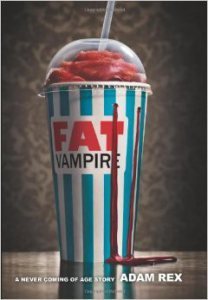
Never judge a book by its cover. Especially this one.
It’s been a long time since I’ve been fooled like this.
Authors generally suck at concealing where they’re going. They telegraph their intentions through tropes and foreshadowing and I am hardly ever surprised. Fat Vampire is full of surprises.
Fat Vampire tells the story of Doug, doughy boring asshole made vampire at 15. He knows he will never get any better so he decides to actively get worse. Characters such as his best friend Jay, desire object Sejal, and goth friends Cat and Ophelia, are rich and strange. The plot is chaotic— the reader is variously worried about vampire hunters, SDCC security, Rocky Horror fans, and older vampires. The result is a tangle that doesn’t neatly fit into any category or meet any expectations. It is still fun to read.
The best thing about Fat Vampire is author Adam Rex’s utterly natural dialogue. He captures the teen register perfectly— they say exactly what they’re thinking no matter how cruel or bizarre it sounds. They see naked emperors everywhere and make puns like ‘Assferatu.’ It’s delightful and laugh-out-loud funny. Rex also supplies bracing, original similes and metaphors throughout. A bad conversational transition explodes and lays on the floor like a pile of dead clowns, for example. No cliches allowed, no tired phrases appear. The prose is refreshing and keeps the reader paying close attention.
The worst thing about Fat Vampire is the protagonist. We never really know what he wants, and maybe that’s because he doesn’t know himself. He tries for hero, tries for villain, tries for romantic lead. He comes off as a creep with no self-awareness just about every time. Along the way, the reader is treated to staggering misogyny, casual homophobia, pathetic geek stereotypes, and a main character who deflects our sympathy the way a cat avoids wearing cute holiday outfits. Doug’s struggle also keeps the narrative twisting away from cohesion; the vampire hunter subplot goes nowhere. The romantic subplot (and I use the term with a suppressed shudder) allows the reader to get to know and love Sejal to an extent that it nearly becomes a book about her, while Doug creepily wishes to possess her without ever knowing her at all.
The last few chapters were impossible to put down. But when it was all over, all I could say was, “What the hell was that?”
It was a book about Doug, the sad little manchild to whom bad things happened.
It was a book about Doug, the total douchebag who deserved everything he got.
It was a book about Jay, who was a good friend and got the shaft.
It was a book about Sejal, who had a fascinating disease but a clear point of view and a spine of steel.
It was a book that (for five minutes in the middle of an expository dump) had a shockingly brilliant idea about the nature of vampirism and its ever-shifting set of rules and myths. I was really sad when that book disappeared.
I can’t even rate this. Averaging it would make no sense. Fat Vampire gets a gold star for Rex’s similes. It gets three crippled bats for the lousy protagonist, but a large cheese pizza for the supporting cast. It gets a 4/5 for readability, but a peppermint hard candy from the bottom of your mom’s purse for overall satisfaction.
Originality is the toughest thing. Fat Vampire is original, if nothing else. I’m going to cautiously recommend it.

November 19, 2014
The Country Gentleman

Be still my teenage heart.
There aren’t many choices when you’re a matronly 15 year old virgin who wants to be someone else. You can’t be the beautiful girl you’d literally kill to become. You’re also locked out of innocent ingénue, femme fatale, and cheerfully slutty girl with no heart.
Your choices are pained-looking goth poet, nerd, and wallpaper.
It should have surprised no one that you decided to become a powerful middle-aged man.
It’s a simple transformation. In a town with a large population of retirement-age individuals, there will always be pleated polyester pants in various shades of neutral. There will be ugly patterned shirts with a breast pocket where you could put cigarettes if you dared. There will be balled-up argyle socks and you can get a couple of pairs for a dollar. Best of all, there are big coats. Wool overcoats with thick-edged buttons, lined in butterscotch satin with deep shotgun pockets inside, cut to make you look like a long rectangle on stumpy legs.
One of those overcoats is a dappled grey and a knot of boys who don’t know you’re still human inside will pelt you with handfuls of peanuts when they decide you’re really an elephant. Don’t wear that one again.
In the blue one that repels water, you’ll walk past the window of that store called “The Country Gentleman.” Everything in the store is dark wood and buttery leather. There’s a whole other life in there made of silver-headed canes and mallard prints. There are pipes and imposing armchairs and if you could somehow turn your bedroom into an English country house then you’d climb out your window into the back garden at Manderley and Maxim de Winter would be there and he would take your hand and he’d have a laugh at how silly you are, dressed in men’s clothes. Silly.
But there’s nothing in there you can afford. You are not Maxim de Winter. Nor the first or second Mrs. de Winter, because no one will ever want to marry you and you can’t wear a dress anyhow. Walk through. That life is more than trappings, but there is this one thing.
Stainless steel flasks. There’s a markup on these, but not too much. For less than $20, you can get the long kind that’s curved on the inside to ride against your leg. For even less than that, you can get the little rounded one, flat in front and back, and a perfect fit in that deep shotgun pocket. Still too much for something is only a talisman. The respect you want cannot be bought.
No, no one saw you drop it in. They’re not even looking. Don’t walk out too fast. Linger. Touch something absently. Pretend you got a text. Duck out the door.
That was easy. You could do it again. Don’t make plans. Never plan on who you’ll be tomorrow.
You’d like to fill it with liquor, something that makes you grimace as it burns on the way down. But you’ve got killer heartburn that comes from nowhere. Actually, it comes from crushing anxiety and a deplorable diet and the gnawing tension of knowing that you can’t be anything but you. So you fill it with Maalox. The crusty white shit collects around the threads on the mouthpiece and it’s hard to get the lid back on.
You practice the things you will say right before you take a swig. Right after. You plan out your deadpan delivery, your wry smile, your artful dodge when you get caught with it at school.
“It’s for heartburn. I’ve got an ulcer. I’ve got the heartburn of the 45 year old beat cop.”
You are that beat cop. They’re going to take you seriously. You wait and see.
The few times you fill it with alcohol you’re disgusted by how it warms against your body. You’d like to drink it cold. But you haven’t learned how. Not yet.



